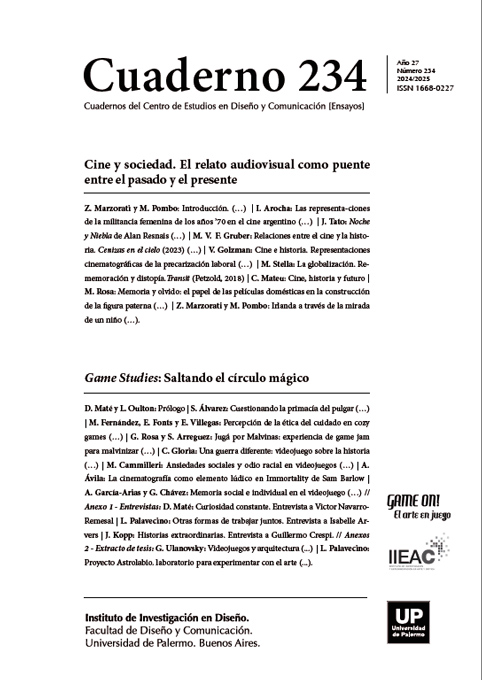Extracto de tesis Videojuegos y arquitectura. (1995-2021). Un estado de la discusión
Resumo
Na década de 1990, o conceito de ciberespaço despertou fantasias de imersão em vários arquitetos que detectaram, na diluição da fronteira entre essa metáfora espacial e sua espacialidade concreta, uma oportunidade sem precedentes para a prática.
Referências
Borries, F., Walz, S. y Böttger, M. (2007) Space Time Play: Computer Games, Architecture and Urbanism: The Next Level. Springer Science & Business Media.
Flanagan, M. (2003) SIMple & Personal: Domestic Space & The Sims. Proceedings of the Melbourne DAC. http://hypertext.rmit.edu.au/dac/papers/Flanagan.pdf
Flanagan, M. (2009) Critical Play: Radical Game Design. MIT Press.
Feireiss, L. (2007) New Babylon Reloaded. Learning from the Ludic City. Borries, F., Walz, S. y Böttger, M. (eds.) Space Time Play: Computer Games, Architecture and Urbanism: The Next Level. Springer Science & Business Media.
Holopainen, J. y Björk, S. (2007) Design Patterns are dead. Long Live Design Patterns. Borries, F., Walz, S. y Böttger, M. (eds.) Space Time Play: Computer Games, Architecture and Urbanism: The Next Level. Springer Science & Business Media.
Hovestadt, L.. (2007) Why Games for Architecture? Borries, F., Walz, S. y Böttger, M. (eds.) Space Time Play: Computer Games, Architecture and Urbanism: The Next Level. Springer Science & Business Media.
Jenkins, H. y Fuller, M. (1995) Nintendo® and New World Travel Writing: A Dialogue. Jones, S. (ed.) CyberSociety: Computer-Mediated Communication and Community. 57-72.
Jenkins, H. (2002) Game Design as Narrative Architecture. Computer, 44. 118-130. Kelly, K. (1 de enero de 1994) Will Wright: The Mayor of SimCity. Wired. https://www.wired.com/1994/01/wright/
Kirkland, E. (2009) Horror Videogames and the Uncanny. Proceedings of DiGRA 2009. http://www.digra.org/digital-library/publications/horrorvideogames-and-the-uncanny/
Lobo, D. (2007) Playing with Urban Life: How SimCity Influences Planning Culture. Borries, F., Walz, S. y Böttger, M. (eds.) Space Time Play: Computer Games, Architecture and Urbanism: The Next Level. Springer Science & Business Media.
Maas, W. (2007) Spacefighter. A Game for the Evolutionary City. Borries, F., Walz, S. y Böttger, M. (eds.) Space Time Play: Computer Games, Architecture and Urbanism: The Next Level. Springer Science & Business Media
Magnet, S. (2006) Playing at Colonization: Interpreting Imaginary Landscapes in the Video Game Tropico. Journal of Communication Inquiry, (30)2. 142-62. https://doi.org/10.1177/0196859905285320
Manovich, L: (2001) The Language of New Media. MIT Press.
Mitchell, W. (1995) Soft Cities. Architectural Design, 118. 8-13.
Murray, J. (1997) Hamlet on the Holodeck. The Future of Narrative in Cyberspace. MIT Press.
Nitsche, M. (2008) Video Game Spaces: Image, Play, and Structure in 3D Worlds. MIT Press.
Novak, M. (1991) Liquid architectures in cyberspace. Benedikt, M. (ed.). Cyberspace: first steps. MIT Press. 225-254
Pearce, M. y Spiller, N. (1995) Architects in Cyberspace. Architectural Design, 118.
Saggio, A. (2007) The New Mental Landscape. Why Games are Important for Architecture. Borries, F., Walz, S. y Böttger, M. (eds.) Space Time Play: Computer Games, Architecture and Urbanism: The Next Level. Springer Science & Business Media.
Schell, J. (2007) “Can I Teleport Around?”. Borries, F., Walz, S. y Böttger, M. (eds.) Space Time Play: Computer Games, Architecture and Urbanism: The Next Level. Springer Science & Business Media.
Vrachliotis, G. (2007) Game of Life. On Architecture, Complexity and the Concept of Nature as a Game. Borries, F., Walz, S. y Böttger, M. (eds.) Space Time Play: Computer Games, Architecture and Urbanism: The Next Level. Springer Science & Business Media.
Walz, S. (2010) Toward a Ludic Architecture: The Space of Play and Games. ETC Press.
Wolf, M. J. P. (2002) The Medium of the Video Game. University of Texas Press.
Los autores/as que publiquen en esta revista ceden los derechos de autor y de publicación a "Cuadernos del Centro de Estudios de Diseño y Comunicación", Aceptando el registro de su trabajo bajo una licencia de atribución de Creative Commons, que permite a terceros utilizar lo publicado siempre que de el crédito pertinente a los autores y a esta revista.


